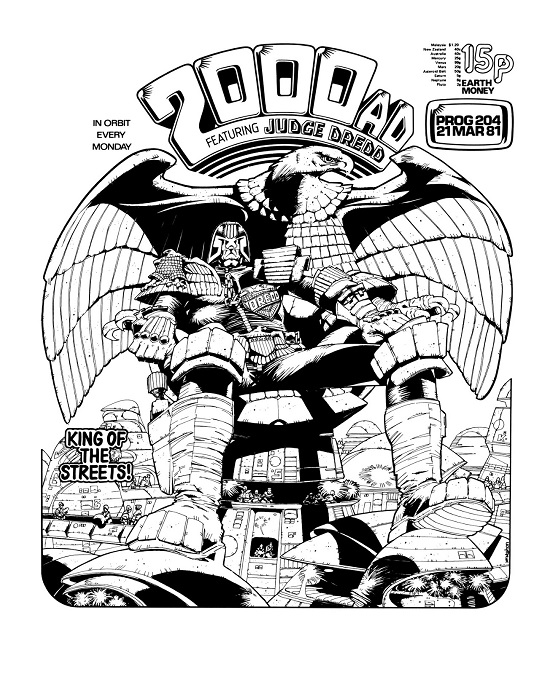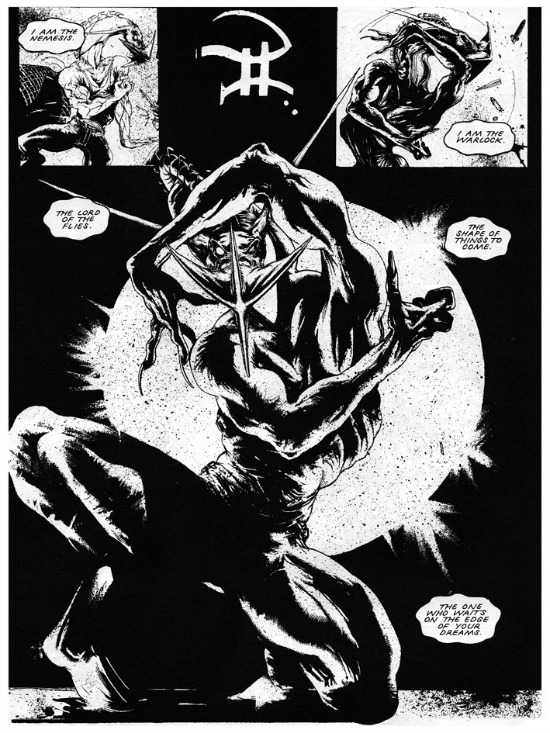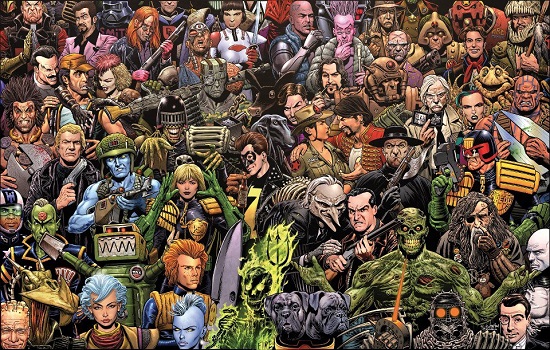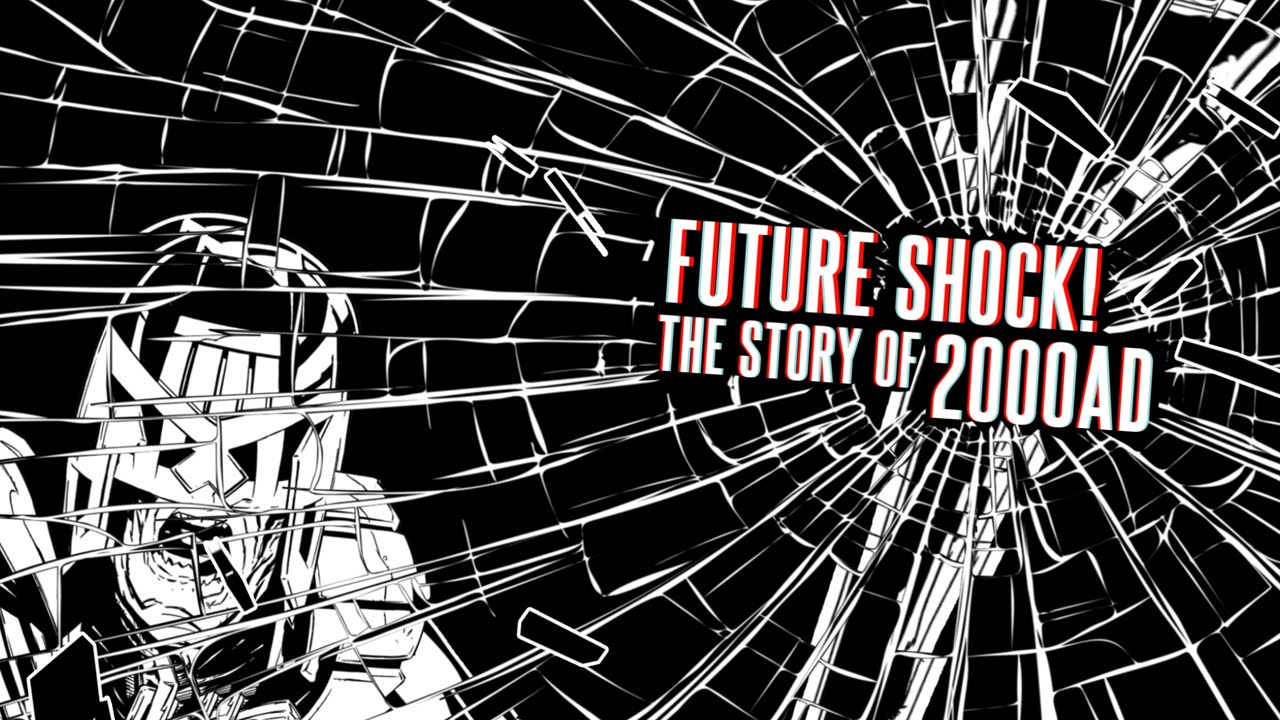For certain folk of a certain stripe (and, ahem, a certain age), the British weekly science fiction comic 2000AD is as essential a component of youthful memories as Chewits and being forced to do PE in your vest and pants. Packed with violence, energy and sly subversive wit, and created by some of the biggest talents in the history of comics, including Alan Moore, Pat Mills, Grant Morrison and Kevin O’Neill, 2000AD affected a whole generation of kids and influenced incalculable numbers of computer games, films, comic books and more. That it’s still going today, and is arguably as good as it’s ever been, is nothing short of a publishing miracle and just goes to show its extraordinary vibrancy and the power of its cast of characters, from Judge Dredd to Nemesis The Warlock; The ABC Warriors to Rogue Trooper.
Comics are notoriously hard things to represent on screen. No matter how many Valhallas of inspiration are occurring while the solitary genius is hunched over the drawing board the visual reality is always going to be someone with a pen squinting at a large piece of paper, so it’s all the more impressive that forthcoming documentary Future Shock! The Story Of 2000AD is such a blast. It helps, of course, that contributors such as Pat Mills, Grant Morrison and Alan Grant are such an outspoken bunch, not at all afraid of hurling around controversial opinions and, in Pat Mills case, an extraordinary amount of swear words. And it helps that the film has been put together with such care and skill by director Paul Goodwin and producers Nick Harwood, Sean Hogan and Hellen Mullane. I met up with Paul Goodwin – an excitable, haribo munching fellow and one of the best adverts I’ve ever seen for the youth bestowing benefits of not giving up on ‘childish things’ – to geek the fuck out and talk about the challenges of bringing The Galaxy’s Greatest Comic to the screen.
What was it that made you decide to make the film?
Paul Goodwin: I was stewing about the missed opportunity that the BBC Comics Brittania documentary was. They had an interview with Pat Mills but they gave him quite short shrift considering his contribution to comics. Then, a couple of years ago, myself and Sean Hogan, the film’s producer who’s an old friend of mine, were chatting about projects we could work on together. He’s big 2000AD fan and so am I, and I said that it was something I would love to see – interviews with all those writers and all those artists and the story of what was going on. Sean thought about for a while and after a few weeks was texting me and going “I keep thinking about you mentioning that, and if you’re serious about it then I think there’s a possibility.” He bought Helen Mullane on board, who is our other producer and a huge 2000AD fan as well. Helen had lots of industry experience and lots of connections in the comic industry. We planned out what we were going to do and set about contacting people and seeing who would be interested in talking to us.
Comics are notoriously difficult to put on screen. Were there any difficulties presenting the information?
PG: You watch a documentary and there’s normally something to show. With the comics you’ve got the images and that’s about it. For the rest you’re relying on people’s anecdotes and stories. It’s nearly 40 years of history and there’s plenty of stuff to chew on. I hope that we’ve distilled it down to a nice overview of the whole story, but also included some of the interesting tangents.
2000AD‘s influence is incalculable. I think you can point at almost any aspect of British pop culture and see that it’s been influenced by it. What’s your earliest memory of reading it?

PG: I bought it as a child, about six years old. That would have been late 70/early 80s. But I bought it randomly – a comic and some sweets with my pocket money. I never really bought it regularly, but the imagery kind of stuck with me. I went back to it years later as a teenager, with friends I met at school who were into interesting subcultural things like comics and punk music. You can claim it as your own in a way. It’s something just for you, something you can know a lot about. It gives you some sort of… power maybe? For a young kid there’s not much you can own in that way. It was like a window into a weird world of stuff that was all so different – war stuff, sci-fi stuff. In Slaine you’ve got all this Celtic mythology… It just goes BOOM! “what is this!?” And then going back and devouring it all, and avidly collecting it from that point on. Although I’m not a 2000AD completist. There are people out there who have read it from prog 1 and that sort of dedication is amazing, but for various reasons over the years – financial etc – I have dipped from my serious collecting period. But I always try and go back to it whenever I can. Once it’s part of your life I think you always remember it fondly. The fact that it’s still going makes you very proud.
There is a sense that people of our generation feel like they have a stake in 2000AD. It’s something that speaks very directly to us. As a result when you see it doing well there is a glow of pride…
PG: Definitely. I bought a couple of those Judge Dredd collected case files. I hadn’t actually read those very early Dredd strips for many years. I was so pleased! I was like “Ah, this stuff is actually brilliant!” It’s not just a fond memory of something that was good when I was 14. And Nemesis The Warlock and Strontium Dog, you read them and they feel as fresh and new today as they did then. It’s like “Yes, I was into some really cool stuff!” It’s really pleasing.
I wonder if that longevity has something to do with its subversiveness? I remember when I was a kid that because it was a comic adults wouldn’t even think to look at 2000AD, so you really felt like you were getting away with something cool and grown-up when you read it.
PG: There was definitely another level to it. It felt mature, and I definitely felt that here were some interesting things that I couldn’t quite understand just yet. But it’s all feeding you in those formative years. You start getting an idea of your own politics and sensibilities and your place in the world. It might sound silly to admit, but I think a lot of it was formed in those years reading 2000AD. Reading the Strontium Dog ‘Portrait Of A Mutant’ story and reading about Johnny Alpha’s upbringing and the mutant suppression. It was dressed as an action adventure story but the sensibilities stay with you long after. When you then become aware of similar issues in real life it’s already part of you…
2000AD has laid the egg, so to speak.
PG: It has and it did. And certainly with the prescience of something like Judge Dredd, not only in terms of sci-fi invention, but in terms of politics and fascism. On the one hand you’re reading it as pure entertainment, but on the other there’s this fascinating subtext, which definitely shaped my sensibilities over the years.
There’s a strange foreshadowing with Judge Dredd as well. The character is invented in the late 70s and the contradiction – which for the guys writing it was hilarious – is that you’re rooting for this fascist. Then the 80s happens and every action movie that comes out features some Reaganite fascist power fantasy in the lead role…
PG: But without the irony!
You’ve got interviews with pretty much everybody… apart from the obvious. Let’s get him out of the way shall we? Was Alan Moore approached?
PG: Of course. Alan Moore famously withdrew himself from speaking about anything to do with comics last winter, In a long email…
Which he wrote on Christmas day, I believe…
PG: I think he started it on Christmas eve! When we started the production we said if we could secure interviews with two out of the big four names that we associate with 2000AD – which would be Pat Mills, Alan Moore, Neil Gaiman and Grant Morrison – then we’d be happy. Three out of that four we were very pleased to get. It’s a real shame that Alan Moore’s contribution to the documentary is missing but that was his decision and I respect his reasons for not wanting to engage.
I do think that Alan Moore’s Halo Jones is wonderful but it is an anomaly. It’s not representative of the whole body of 2000AD.
PG: No, and I don’t think any one strip is. 2000AD is – it’s clichéd to say – but it’s the sum of its parts and more than the sum of its parts. It’s many things coming together. That’s the beauty of it.
And that’s been its strength and its weakness. There have been moments where its like magic and you’ve got Nemesis and you’ve got strontium Dog and you’ve got Rogue trooper…
PG: Well I can tell the era that you’re talking about! I’ll tell you what, it’s strong now. It’s awesome at the moment, and this isn’t just marketing. The film has no affiliation to (publisher) Rebellion or 2000AD. We’ve made it with their blessing and they’re aware of it but they have no creative control. But across the spread of five or six stories it’s as strong as it’s been… I think ever! It’s really really good right now. It makes you proud that it’s stuck to it’s guns and survived. As you see in the film there were times when it nearly didn’t survive and there were times when it changed what it was. Whenever it’s tried to do that it didn’t really work.
The film doesn’t shy away from that either. You’re straight up about showing the negative periods in its history.
PG: Well, we certainly didn’t want to make just a 2000AD fan film. That’s not an interesting story for anybody. I mean those guys are all such creative forces – such characters – and where they’ve bonded as well as when they’ve clashed is really interesting to us as makers of the documentary. Of course we’re not going to shy away from the darker period of its history.
We’re lucky because the guys we spoke to were really honest and open and frank, especially about their mistakes. I think people’s respect for the comic brings out the truth. The people that have engaged with the documentary have done it because of their passion for the comic. The majority of them told us they were happy to take part because they’re proud of their involvement in 2000AD.
Time for some supremely geeky questions. There’s your 2000AD big hitters – Moore, Morrison, Mills – but who do you reckon is underrated?
PG: Pete Milligan. It was an honour to meet Grant Morrison and to interview Pat Mills and interview Neil Gaiman. Those guys especially because they’re super busy, world travelling people and to have them give their time was really cool. For me though, I do personally think Pete Milligan is one of the most underrated comic book writers out there and it’s probably just because, for whatever reason, he didn’t have that one big iconic smash hit like a Watchmen or a Sandman. Hopefully he will. Some of his stuff in 2000AD – Bad Company especially… That was one of my strips that I followed weekly. I would love to see someone make Bad Company in another medium…
What are your favourite characters? You don’t have to pick one because that’s too hard…

PG: The one that screwed me up in the head the most was Nemesis. That was the one that puzzled me the most. It was the weirdest. The one where you had to go “what the fuck is this? What is going on here?” It was just nuts, from the writing all the way through to the design. All the artists that they picked had that crazy attitude. Just freaky. I remember when John Hicklenton started – as if they hadn’t had enough crazy artists working on that strip! He just blew them out of the water. That stuff made you feel sick looking at it! You had to read it in two or three goes. I hadn’t seen anything like that at the time and I haven’t seen anything like it since. Nemesis was the big one for me.
Finally, if you could write one character who would you like to have a crack at?
PG: Maybe writing a sub-character would be good. You know the story where Nemesis has to harness the Blitzspear? He has to hunt it and harness it and ride it. It was like a little nod to the fact that the Blitzspear had its own history. I was thinking there’s probably a little story there. Those sorts of little side stories happened all the time in 2000AD.
Future Shock! The Story Of 2000AD is showing tonight as part of the BFI’s Sci-Fi Days Of Fear And Wonder season



